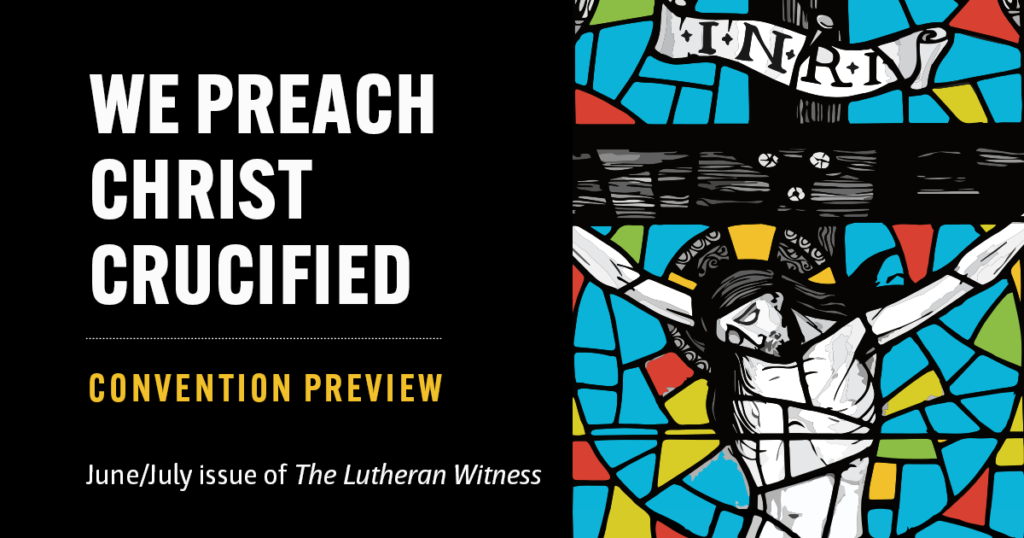In his letter to the Corinthians, St. Paul addressed their life in Christ. The church was marked by division, immorality, pride and the misuse of the Sacrament. Questions of idolatry and how to live properly, including marriage issues, vexed the Corinthian Christians. To all of this, Paul wrote “We preach Christ crucified,” which was chosen as the theme for the 68th Regular Convention of The Lutheran Church—Missouri Synod this summer. This “word of the cross” is the power of God and the wisdom of God. The convention essays will explore how the preaching of Christ crucified remains the power and wisdom of God for the redemption of the world. This truth echoes in LCMS, her partner churches and in every witness to those around us. The church preaches Christ crucified and trusts that through the church’s preaching God’s power and wisdom does what He desires and promises.
We Preach Christ Crucified
The Rev. Dr. Thomas Egger
Ancient Roman graffiti shows a man standing before a large crucifix, with our dying Lord pictured with the head of an ass, with the inscription, “Alexamenos worships his God.” In our day, as in days of old, Christianity is mocked and derided. The church in the West is shrinking. Our children are wandering. Our neighbors are uninterested. What can we do? We preach Christ crucified. From the creation of the world to its final gasp, this is God’s single, gracious, wise, powerful plan to save sinful humanity. Let us not grow weary or discouraged, but take up this God-given task with joy and confidence. Let us preach and publish near and far this amazing message: God’s Son, in love, has shed His blood for all!
The Power of God
The Rev. Dr. Abjar Bahkou
When we are baptized into Christ, we are a new creature and, as a new creature, grow daily by carrying the cross and following Christ. Christianity sees the cross not as an instrument of torture, but of life that comes out of death. On the cross, people die; from it, Christ made His way back to life. This essay presents the Lutheran perspective on how to preach the power of the cross in a shame and honor culture, and it discusses the task of baptized believers in proclaiming the power of God on the cross.
The Wisdom of God
Dr. Russell Dawn
Christ, the wisdom of God, makes us wise unto salvation, and only in such wisdom can we truly comprehend reality and live God-pleasing lives. But as Luther warns, the devil fights against the wisdom of God, enticing us toward idolatry. This idolatry renders us fools in eternal things and causes chaos in temporal things. We see this chaos burgeoning all around us. The faithful life in the midst of idolatrous chaos is, as it always has been, to preach Christ crucified and abide at the foot of the cross as salt and light in our families, communities and societal institutions.
The Redemption of the World
The Rev. Dr. Juhana Pohjola
“But we preach Christ crucified” (1 Cor. 1:23). This is the mission statement of St. Paul. This message, which is the wisdom and strength of God, has only one goal: to save us. What does it mean to preach the Gospel of salvation in our times? What challenges and opportunities do we have in a rapidly changing and even hostile post-Christian environment? What can we learn from St. Paul in how the Gospel of the redemption of the world is also sacramental and communal?

This article originally appeared in the June/July 2023 issue of The Lutheran Witness.






Then to what end, precisely, and with what attitude, do we “preach Christ crucified…”?
We know that Christ came to change where people are headed and how they live (John 10:10b; 13:17; 15:11). And he came out of love (John 15:13).
So while our preaching may reflect supreme confidence in our doctrinal rectitude over and against the wayward thinking of the rest of the world, if we do not earnestly depict the good that we desire for people, then our message lacks love and has all the impact of “a noisy gong or a clanging cymbal” (1 Cor. 13:1 ESV).
I would understand 1 Cor. 1:23-24 to mean something like this: We do not try to impress people by way of astounding spectacles or an erudite philosophy. Rather, out of love, we aim to convey what Christ through his crucifixion achieved and how that transforms for good the lives of those who believe it.
“And walk in love, as Christ loved us and gave himself up for us, a fragrant offering and sacrifice to God” (Eph. 5:2 ESV).
“And he died for all, that those who live might no longer live for themselves but for him who for their sake died and was raised” (2 Cor. 5:15 ESV).
Paul, thank you for reading the blog so assiduously. We appreciate such dedicated readers!
I don’t think the convention essayists are writing to “impress people by way of astounding spectacles or an erudite philosophy.” To the contrary, I imagine they’re writing to encourage people to do exactly what you have suggested: Share the message of Christ crucified and what His death means for us.
RSA
We Preach Christ Crucified because I am Free to Live , I Am Free to Love , I Am Free to Forgive, I Am Free to Be Me , I Am a Child of God.
Paul indeed said, “We preach Christ crucified,” and many denominations, despite rancorous differences and long standing doctrines, would agree. After all, it is who we are, followers of Christ, albeit unable to achieve full unity in the faith. When I first read 1 Corinthians 1: 11-13, a long time ago in my Christian walk, it appeared evident to me…”Hey, this must be where the church was evidently splitting into denominations, after all, Paul observed that some believers followed him, others followed Apollos, Cephas? How do we interpret this verse?” As a lay person, and not a theologian, I admit to my often disconcerting thoughts about the issues which have beset the church since the beginning. The failure to agree on Baptism, infant or adult, immersion or sprinkling, communion (sign or actual presence), sanctification, justification, end times prophecy, and list goes on. Confusing to theologians, even more confusing to those of us who are less educated. Am I alone? Am I a Lutheran if I question some of our distinctives and doctrines, or just wonder if we are 80 percent correct, 20 percent wrong? These are doubts which have not been resolved in my own mind, and probably won’t on this side of glory. Thank God there are still areas of unity, and we can rely on their clarity. I think this lack of unity he saw in his day also troubled him greatly. So Paul said we must preach Christ crucified. I humbly agree.